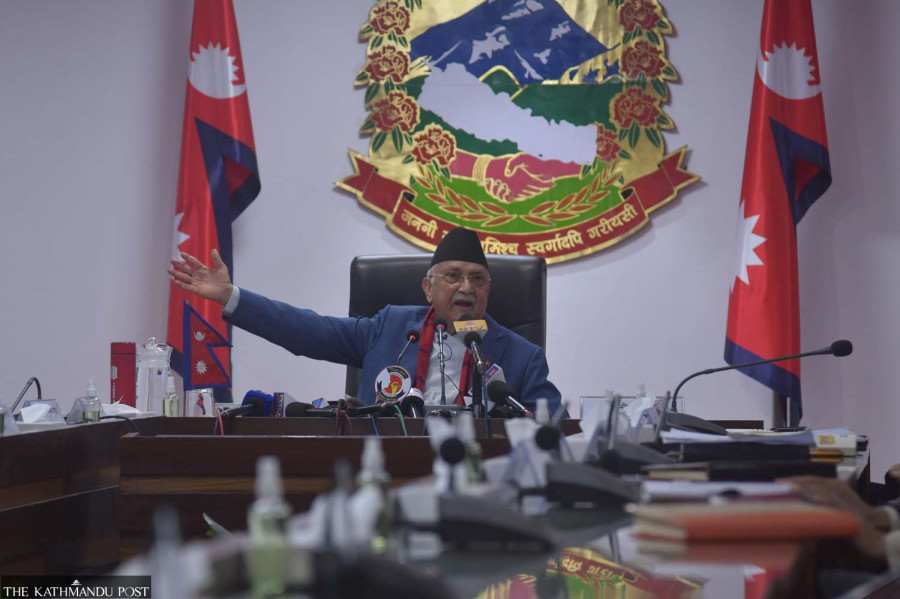National
We were not prepared for a catastrophe of such magnitude: Prime Minister Oli
The prime minister admits delays and lapses in the search and rescue of disaster-hit people.
Post Report
Prime Minister KP Sharma Oli has said that the government had never imagined or prepared for a natural disaster of such magnitude, one that has killed at least 224 people and injured 158.
Incessant rains that started on Thursday and continued through Saturday last week caused a huge loss of lives and properties in several parts of the country.
Addressing a press conference at his office on Tuesday, the prime minister said that the Department of Hydrology and Meteorology had forecast heavy rainfall and the government had prepared accordingly, like it did in the past.
“Such heavy rainfall rarely occurred in the past. We had made some preparations accordingly,” Oli said, admitting the lapses in search and rescue operations. “We faced a huge catastrophe.”
When Nepal was reeling under the loss of lives and properties unleashed by the floods and landslides, the prime minister was in the United States of America. Many people have criticised the prime minister for not returning home when the country was facing a crisis of such magnitude.
“I was taking regular briefings from Kathmandu,” Oli said, responding to the criticism.
“I was fully aware of the situation but never imagined the magnitude of the disaster. As soon as the disaster hit the country, the government immediately took steps for search and rescue operations.
“It does not mean that we have not done anything. We tried our best but there were some weaknesses too.
“Since the magnitude of the damage was huge, our priorities were multiple. There might have been some delays in some areas. But no one was knowingly negligent.”
Oli added that the security forces have rescued over 4,000 people and they should be thanked for that. “If they were not rescued timely, the death toll could have been higher,” he said.
At the news conference, the prime minister also shared the data of the disaster and the damage caused.
As of Tuesday, as many as 224 people had been killed, 24 gone missing and 158 injured, according to the prime minister. A total of 4,331 people who were at high risk were rescued and taken to safety. Out of the 77 districts, 21 districts were badly affected, including Kathmandu, Lalitpur, Kavrepalanchok, Sindhupalchok, Sindhuli and Makawanpur.
The disasters are estimated to have caused losses exceeding Rs17 billion, including the damage to drinking water supply, roads, hydropower and energy, and irrigation facilities. The disasters damaged the highways at 37 places; obstructions at nine places had been removed, said the prime minister, according to a statement read out by Chief Secretary Ek Narayan Aryal.
The disasters damaged as many as 16 hydropower stations that were currently producing 667.9 MW power and 18 hydropower stations that have a total installed capacity of 1,139 megawatts. Five major transmission lines were also affected.
Meanwhile, as many as 312 sites of Nepal Telecom sustained damage, according to the data provided by Aryal. The agriculture and livestock sector has suffered damage worth over Rs6 billion. As many as 30,000 security personnel were deployed for search and rescue operations, said Aryal, and the government has started distributing relief amounts to those affected by the floods and landslides.
The search and rescue of those affected by the disasters will be completed within two days, said Aryal, and the government will rehabilitate those people.
The government will provide cash relief to those who have lost their houses to build temporary residences. The government will provide free treatment to the injured, and will conduct health camps in affected areas in coordination with local governments in order to avert possible outbreaks of diseases, Aryal said.
The government will restore drinking water projects as soon as possible, maintain roads and highways, and install Bailey bridges where necessary, Aryal added. Priority is given to the restoration and maintenance of roads and highways in order to resume transportation, the chief secretary said. Telephone infrastructure and transmission lines would be restored with priority.
Meanwhile, Oli said that the government was serious about solving the problem in cooperatives. The funds of the cooperatives have been embezzled in such a way that depositors’ savings are difficult to return, he said. “We also had to look at the law for how much money can be returned, how much can be recovered, what process can be followed.”
Oli promised to act within the scope of the law to solve the problem facing the cooperatives sector.
Oli also appealed to the people to help in search, rescue and relief operations, considering the suffering of the people as a common national pain.




 13.12°C Kathmandu
13.12°C Kathmandu













